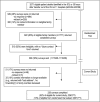Predictors of symptoms of posttraumatic stress and depression in family members after patient death in the ICU
- PMID: 19762549
- PMCID: PMC2816640
- DOI: 10.1378/chest.09-1291
Predictors of symptoms of posttraumatic stress and depression in family members after patient death in the ICU
Abstract
Background: Patients' deaths in the ICU have been associated with a high burden of psychologic symptoms in families. This study identifies characteristics associated with psychologic symptoms in family members.
Methods: Families of patients dying in the ICU or within 30 h of ICU discharge in 11 hospitals previously participated in a randomized trial. In the current study, we assessed these families for symptoms of posttraumatic stress disorder (PTSD) and depression with follow-up surveys. Outcomes included validated measures of PTSD (PTSD Checklist) and depressive (Patient Health Questionnaire) symptoms. Predictors included family member mental-health history, involvement in decision making, and demographics.
Results: Surveys were completed by 226 families. Response rate was 46% in the original randomized trial and 82% in this study. Prevalence (95% CI) of PTSD and depressive symptoms were 14.0% (9.7%-19.3%) and 18.4% (13.5%-24.1%), respectively. Family characteristics associated with increased symptoms included: female gender (PTSD, P = .020; depression, P = .005), knowing the patient for a shorter duration (PTSD, P = .003; depression, P = .040), and discordance between family members' preferences for decision making and their actual decision-making roles (PTSD, P = .005; depression, P = .049). Depressive symptoms were also associated with lower educational level (P = .002). Families with psychologic symptoms were more likely to report that access to a counselor (PTSD, P < .001; depression, P = .003) and information about spiritual services might have been helpful while the patient was in the ICU (PTSD, P = .024; depression, P = .029).
Conclusions: Families demonstrated a high prevalence of psychologic symptoms after a death in the ICU. Characteristics associated with symptoms may help target interventions to reduce these symptoms.
Trial registration: clinicaltrials.gov; Identifier: NCT00685893.
References
-
- Azoulay E, Pochard F, Kentish-Barnes N, et al. FAMIREA Study Group Risk of post-traumatic stress symptoms in family members of intensive care unit patients. Am J Respir Crit Care Med. 2005;171(9):987–994. - PubMed
-
- Pochard F, Darmon M, Fassier T, et al. French FAMIREA study group Symptoms of anxiety and depression in family members of intensive care unit patients before discharge or death. A prospective multicenter study. J Crit Care. 2005;20(1):90–96. - PubMed
-
- Siegel MD, Hayes E, Vanderwerker LC, Loseth DB, Prigerson HG. Psychiatric illness in the next of kin of patients who die in the intensive care unit. Crit Care Med. 2008;36(6):1722–1728. - PubMed
-
- Pochard F, Azoulay E, Chevret S, et al. French FAMIREA Group Symptoms of anxiety and depression in family members of intensive care unit patients: ethical hypothesis regarding decision-making capacity. Crit Care Med. 2001;29(10):1893–1897. - PubMed
Publication types
MeSH terms
Associated data
Grants and funding
LinkOut - more resources
Full Text Sources
Medical


